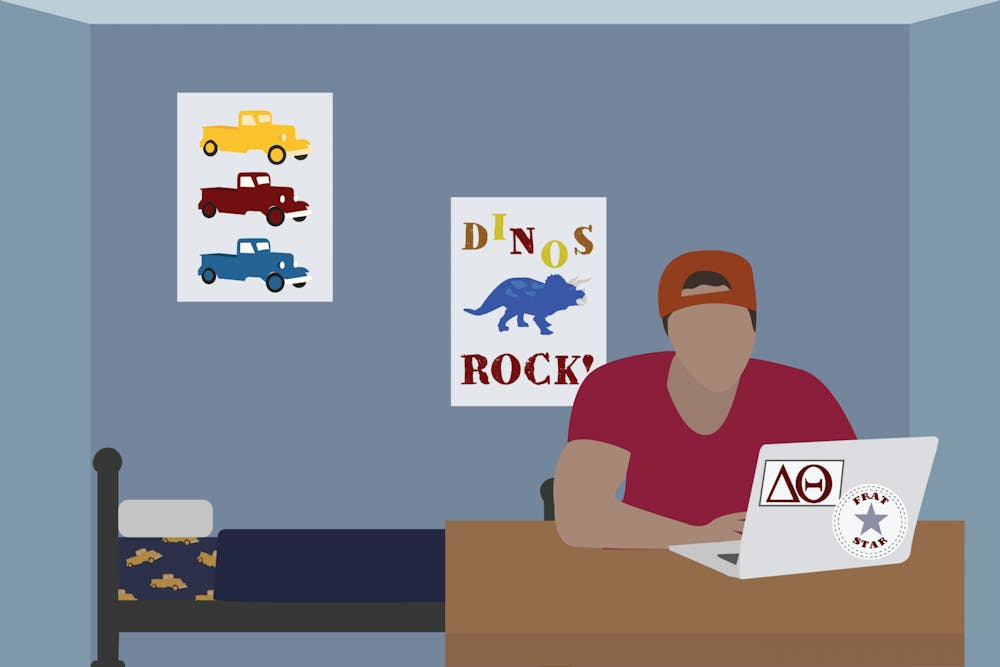It’s Jan. 18, 2020, only a couple months before the pandemic begins. On OAX bid day, new members are gathered inside the sorority house. They receive their bid day t–shirts, embellished with OAX’s logo, and get to know the unfamiliar faces. It’s snowing, and the older OAX members are waiting outside.
Bid day is one of the few events that all 200 of the sorority members attend. As the new recruits burst through the house doors and into the falling snow, older OAX members, among them Sophie Perez (E’ 21), cheer excitedly in anticipation of meeting their younger members. Having been in charge of recruitment, Sophie—also OAX’s president—looks back on this moment as one of her favorite Greek life memories.
Now, Sophie leads chapter meetings on Zoom in a cozy sweatshirt, sitting in her room in Philadelphia. She talks to herself as she gets set up for the meeting, sometimes forgetting everyone’s listening. A few sisters crack inside jokes, and Sophie hears laughter come from her screen. Needless to say, it’s very different from previous chapter meetings she’s led in Huntsman Hall, where she stood behind a podium controlling three projectors.
OAX, an off–campus sorority, is not affiliated with Penn’s Panhellenic Council. But, like many other Greek organizations, it has experienced drastic changes this past semester due to COVID–19.

After Penn closed its campus in March, many students in Greek life found themselves separated from their primary source of socialization. With classes shifting online in the spring and continuing virtually through the fall semester, Greek organizations have also turned to mainly remote events, providing members with a sense of community that’s been otherwise lacking. But some members, turned off by continuing dues and the lack of in–person gatherings, have decided to deactivate or take a leave of absence. Despite Penn’s recent announcement that students will be welcomed back to campus in spring 2021, Greek life faces the prospect of another virtual semester. This time, it will clash with recruitment efforts, leading some to worry that membership may see a permanent downturn.
Most of Penn’s Greek organizations have been connecting through virtual platforms such as Meetsy and Zoom. While it has been relatively easy to keep up with current friends, expanding friendships to connect with other members of the fraternity or sorority has proven difficult due to COVID–19, according to Sophie. She says that she has been trying to keep engagement up through online events such as iMessage’s Cup Pong, Zoom happy hours, and virtual chapter meetings.
Despite it being harder to form connections virtually, Sophie says that turnout at these events has been “pleasantly surprising.” She thinks that turnout might even be better because of the ease of signing onto a Zoom meeting. Around 100 OAX members attend each virtual chapter meeting, and almost everyone who signs up for an online social event also shows up, which is a significant increase from before the pandemic.
She notes that “underclassmen are really eager because they didn’t get to form those friendships as much” since spring semester was cut short. OAX sophomores have had almost perfect attendance at chapter meetings and events, and Sophie has noticed them engaging more in group chats, participating more in event planning, and reaching out to their sorority sisters. OAX has also eliminated dues and obligations to attend events this semester, which she says has allowed the organization to retain all of its members since the pandemic began.

Sahitya Mandalapu (W ‘21), president of Penn’s Panhellenic Council, adds that Greek life’s goal of effecting change in the larger Penn community has not been lost. Greek organizations have continued to engage in virtual philanthropy. PHC has fundraised for Black Lives Matter Philly and Attic Youth Center, and they are currently working on an event to distribute coffee to healthcare workers. The PHC, Interfraternity Council and the Intercultural Greek Council are also switching up the way they approach standard Greek life programming this semester. This fall’s Greek Week, held October 12–16, was a social justice week.
“Normally, Greek Week is a celebration of being Greek. It’s a social event where people meet out on Locust Walk and there’s a barbecue, for example,” says Kaden Stenger (C ‘22), vice president of programming for the IFC. But this year, “every day of the week, we addressed a different issue and brought in different speakers,” says Sahitya. These speakers included representatives from the LGBT Center, Penn Violence Prevention, and Penn Community of Justice.
But Josh*, a member of an off–campus, non–IFC affiliated fraternity, isn’t so sure about online events. He emphasizes Greek life’s center in large parties and social gatherings: “one of the overarching goals of any fraternity is to have a good time.”
“Anyone who tells you that Greek life is about community or philanthropy over partying is kidding you,” Josh says.
While other organizations have adapted to a virtual environment, his fraternity has continued to host in–person activities such as beer pong and date nights. These events have come with considerable risk: Josh says that there have been several COVID–19 scares for the fraternity members, which forced them to quarantine and test negative for the virus before getting together in–person once more.
But for the most part, potential new members of Greek life will have to dive headfirst into an unknown world through these virtual platforms. Penn’s on–campus Greek organizations have decided to conduct official recruitment events entirely online, according to Sahitya and Kaden. OAX’s virtual events include information sessions, getting to know potential new members, and various breakout room components over Zoom for smaller groups. Sophie says that although they held similar events before the pandemic, the information sessions will mostly entail explaining that a lot is uncertain right now. She notes that OAX’s “rush process is usually really organic,” and that “it’s definitely going to be different [this semester], because we haven’t had this whole fall to meet people.”

First years are optimistic that virtual recruitment and membership will still be rewarding. In high school, Faith Bochert (W ‘24) never thought she would rush a sorority, but she is now actively pursuing the process. She attributes some of her newfound desire to join Greek life to COVID–19, saying that the pandemic has made a group of women that she can trust sound even more appealing.
“I think doing it all over Zoom has actually, for me at least, made it a little bit more approachable, because I’m still kind of in my comfort zone while I’m trying something new, so it makes it a little easier to try new things,” she says. However, although she’s excited to become a part of a new community, she thinks the experience won’t feel complete until she meets people in person. “It’s going to be a lot of waiting around for things to go back to normal before we feel like we’re really in it,” she says.
Charlie Schumer (C ‘24) was inspired to rush by his sister, a recent graduate of Iowa State University who was heavily involved in Greek life throughout her years in college. Charlie says that his sister combated the stereotype that Greek life is just a party and emphasized the pillars of personal development, leadership, and community service she gained through her experience.
Charlie notes that one of the positive aspects of going through the recruitment process online has been the ability to form one–on–one relationships, in contrast to the parties or large–group events that make up more traditional forms of rush. However, he also feels that it has been more difficult to get to know people virtually. He says that the events have mostly consisted of talking to members of the fraternity about next steps in the rush process and what it’s like being a member of Greek life.
“When you’re on a Zoom call, I like to think of it as ‘you’re on,’ you’re focused, you’re paying attention to the task at hand,” he says. “But for me, really getting to know people on a more personal level, on a level beyond just what people present, is you have to see them when they’re ‘off,’ when they’re not focused.”

Still, Charlie feels that even though he may not form close bonds with as many brothers next semester, he would gain the same experience. “Greek life is a lifelong commitment,” he says. “It’s not just something that I’m going to remember for the years that I’m here at Penn. Even if maybe this next semester isn’t as fulfilling or I don’t get as much out of it, I think participating in it will still give me values that will continue.”
Current members of Greek life are more skeptical about the online experience. Lily Sherwood (C ‘21), a member of Sigma Kappa, feels that first years will miss out on the camaraderie between students during recruitment.
“I found that even though I ended up in one sorority and not everyone who was rushing with me ended up in that same sorority, I met a lot of people who I’m still friends with,” she says. “That comes from waiting in lines and being in different rush groups and just going through the process and having random people who are also experiencing it talk about it with you in Houston Hall after each round.”
She’s decided to take a leave of absence from Sigma Kappa this semester. “I didn’t feel like I would be getting the full experience,” Lily says. She also says that taking time to focus on school and career played a role in her decision.

Ella Roth (C ‘21) made the decision to deactivate from Zeta Tau Alpha this semester. COVID–19 was a part of her decision, but it wasn’t the causal factor. With most of her close friends in the sorority already having graduated or deactivated, Ella felt like she had gotten everything she wanted out of Greek life. When Greek life programming shifted online, she says that attending “mass Zoom calls” wasn’t worth it for her.
Ella also points to the high financial costs of Greek life. “I overall couldn't justify paying high dues for not getting that much out of it. And that was already something I was thinking about,” she says. “Especially now that it's virtual, I really couldn't justify paying for it.” Ella also knows several other members of ZTA who deactivated this semester.
The future of Greek life on Penn’s campus hinges on a number of factors. Sahitya says it really depends on if students come out as usual for recruitment or choose to wait until their sophomore year, which will be unknown until later in the spring semester. Will organizations begin to gather in–person after the expected return to campus in January? The university’s policy on these events—as well as on–campus Greek housing—are unclear, and the health risks will still be high.

As COVID–19 cases rise nationally, the count of total confirmed cases in Philadelphia County surpasses 65,000. In the past week, 100 members of the Penn community have tested positive.
Still, Penn currently plans to open its campus in the spring semester. Students living on–campus will live in single rooms and be assigned to bathrooms with no more than five others. Additionally, students will be able to gather in small groups, given that they wear face coverings and practice social distancing. All undergraduates returning to campus will also be tested for COVID–19 twice weekly, and they will be required to report any symptoms daily through PennOpen Pass.
Some are dubious that campus will actually reopen, citing the University’s August decision reversal in particular. “I saw the email, and it kind of surprised me because it doesn’t feel like anything has developed in terms of COVID–19 and regulations,” Josh says. “With everyone on campus, it’s hard for me to imagine any type of responsible social event with that many people around.”
* Indicates a name has been changed for anonymity.





